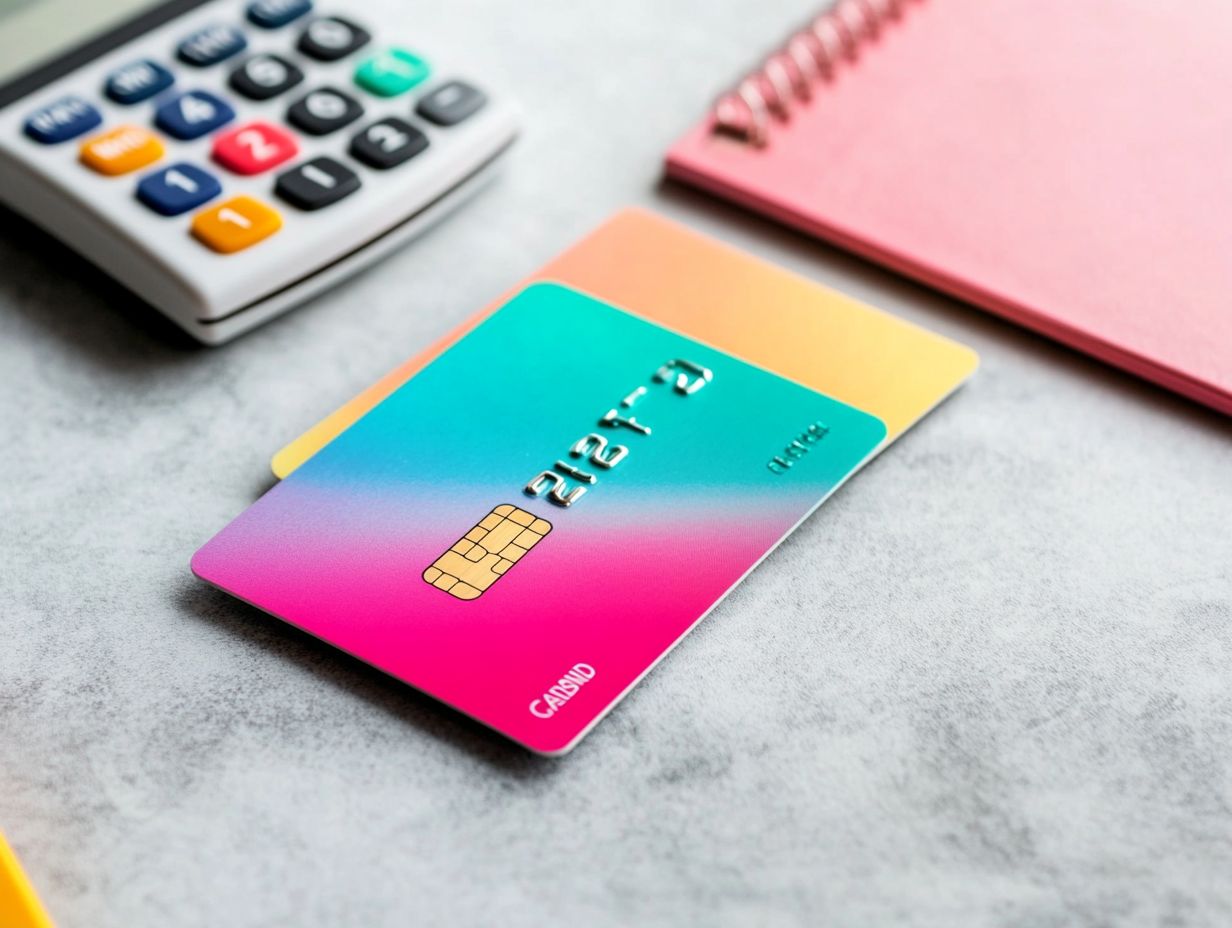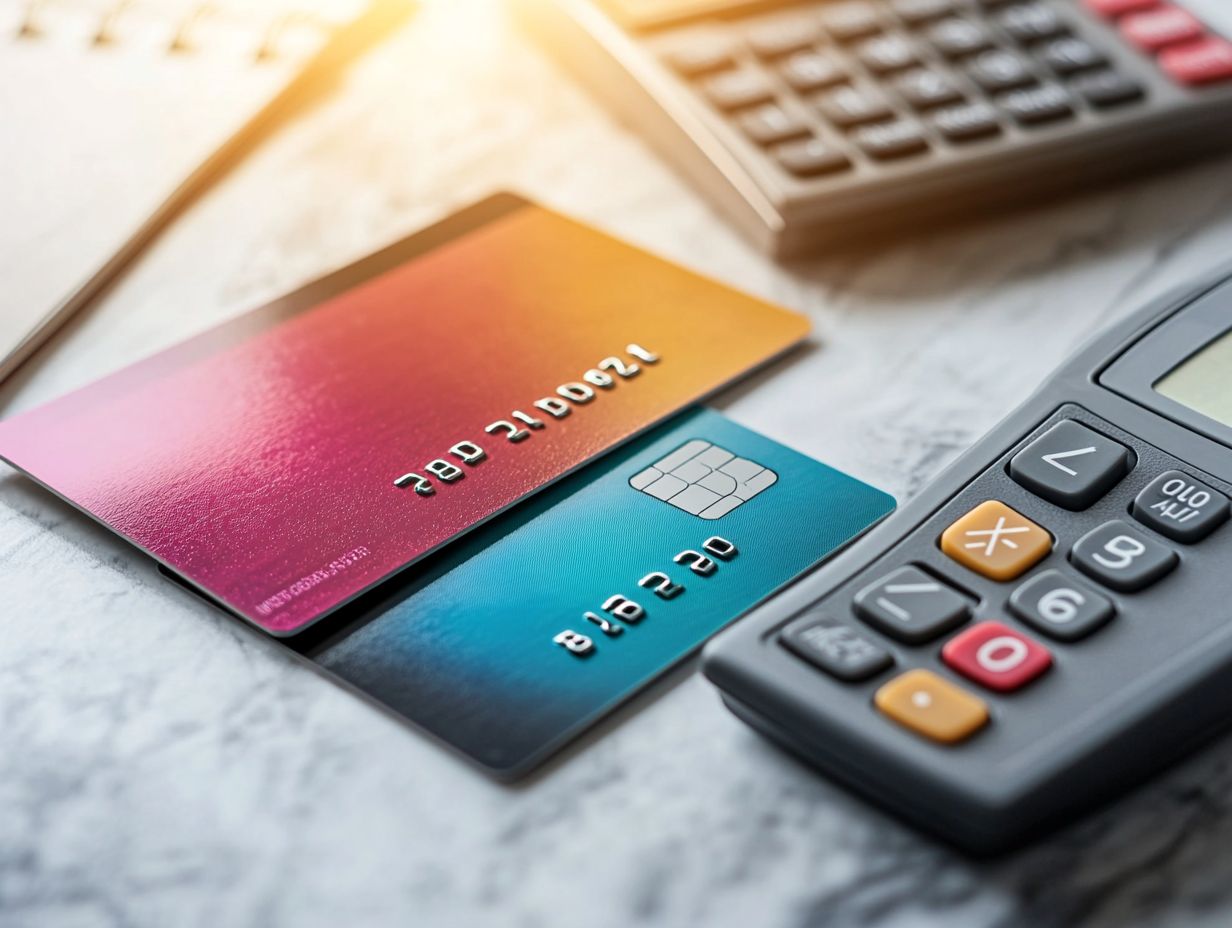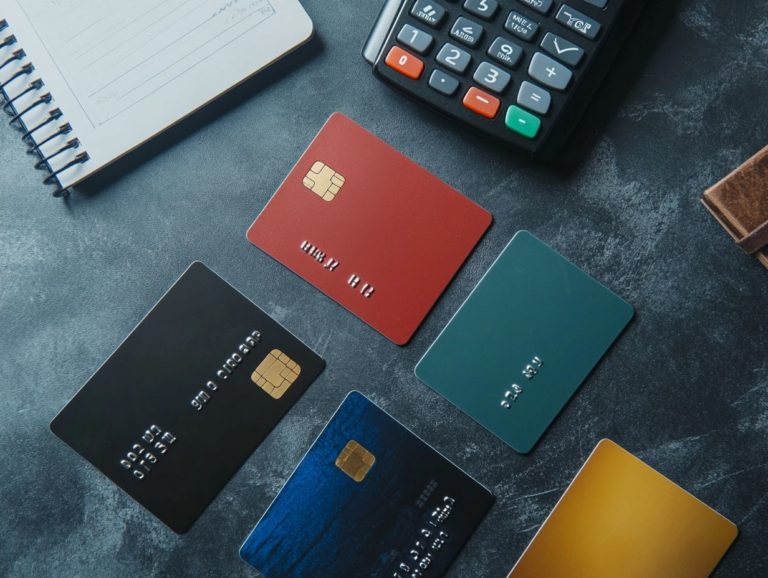How to Choose Between Personal and Business Credit Cards?
Credit cards can serve as powerful instruments for managing your finances, whether for personal use or business expenses.
This article delves into the distinct features and advantages of personal and business credit cards, guiding you on when to utilize each type effectively. It also highlights crucial factors to consider when selecting the right card for your needs, such as your credit history and spending habits.
You will find practical tips to manage your credit card use and avoid common pitfalls.
Embark on this journey through the world of credit cards and enhance your financial decision-making skills!
Contents
- Key Takeaways:
- Personal Credit Cards
- Business Credit Cards
- Factors to Consider When Choosing Between Personal and Business Credit Cards
- Tips for Managing Credit Cards Effectively
- Frequently Asked Questions
- What are the main differences between personal and business credit cards?
- How do I determine whether I need a personal or business credit card?
- What are the advantages of using a business credit card?
- Can I use a personal credit card for my business expenses?
- Is it possible to have both a personal and business credit card?
- What should I consider when choosing between personal and business credit cards?
Key Takeaways:

- Consider your credit score and spending habits when choosing between personal and business credit cards.
- Take advantage of rewards and benefits offered by credit cards, but remember to manage them effectively through budgeting and payment strategies.
- Use a personal credit card for everyday expenses and a business credit card for business-related expenses to keep your finances organized and separate.
What are Credit Cards?
Credit cards serve as invaluable financial tools that enable you to make purchases and access credit up to a set limit. They offer both convenience and flexibility in managing your finances.
Credit cards come in various forms, including personal credit cards and business credit cards, each crafted to meet different financial needs. With features like consumer protections, enticing rewards programs, and introductory APR (Annual Percentage Rate), they enhance their attractiveness as payment options.
These versatile instruments help you make daily purchases and also play a significant role in shaping your credit score, which in turn influences your future borrowing capabilities. Personal credit cards are designed for individual users, often accompanied by benefits such as cash back or travel rewards. Conversely, business credit cards cater specifically to enterprises, equipping you with tools to track expenses and keep track of your money.
By providing consumer protections like fraud liability coverage and adjustable credit limits based on your spending behavior, credit cards empower you to make informed financial decisions. This ultimately allows you to build and keep good financial habits, setting you on a path toward financial wellness.
Personal Credit Cards
Personal credit cards are crafted exclusively for individual consumers, granting you the financial flexibility to navigate daily expenses with ease.
They come equipped with distinctive features tailored to your unique spending habits and requirements. With these cards, you can enjoy perks such as cash back rewards, personal protections, and valuable tools designed to help you maintain a healthy credit score.
Features and Benefits
Personal credit cards offer a remarkable array of features and benefits designed to elevate your experience. From enticing rewards programs that provide points, miles, or cash back to flexible spending controls that empower you to manage your finances with ease, these cards are tailored for your lifestyle.
Many personal credit cards also feature special introductory APR rates, making them particularly appealing if you’re considering a large purchase or looking to consolidate debt.
These rewards programs are designed to suit various lifestyles, allowing you to collect points for travel or earn cash back on everyday purchases, aligning seamlessly with your preferences. Spending controls, like budget alerts and customizable limits, offer you peace of mind, ensuring you stay on track with your financial goals.
With competitive introductory APRs, you can enjoy reduced interest rates for a limited time, facilitating improved cash flow during significant purchases or transitional periods. Ultimately, these comprehensive features not only meet your practical financial needs but also enhance the overall experience of using personal credit cards.
Join us on this exciting journey to master your finances!
When to Use a Personal Credit Card
Knowing when to wield your personal credit card can be key in maximizing its benefits while keeping your financial health intact. This is especially important regarding your spending habits and overall financial decisions. These cards are perfect for everyday purchases, earning rewards, and managing unexpected expenses. They also allow you to build your credit history responsibly.
For example, when you regularly spend on groceries or gas, using a credit card that offers cashback or points can lead to considerable savings over time. When making larger purchases, tapping into your card can provide you with an interest-free grace period, enabling you to manage your cash flow with finesse. If you travel often, opting for cards with travel perks can unlock free flights or hotel stays, significantly enhancing your experiences.
Take a moment to assess your spending patterns to unlock maximum rewards! Select cards that resonate with your lifestyle to truly reap the benefits.
Business Credit Cards

Business credit cards are specific tools for small business owners. They offer distinct features that cater to your needs in managing expenses and optimizing financial resources.
These cards typically come equipped with valuable benefits like employee cards and bookkeeping tools. They also help maintain a clear separation between personal and business finances, which is essential for effective record keeping and ensuring your financial health remains robust.
Features and Benefits
The features and benefits of business credit cards provide you with the spending flexibility you need, along with detailed reports that streamline your expense tracking. This ultimately supports your ability to make informed financial decisions.
Many of these cards come with rewards tailored to specific spending categories, enhancing their value for your business purchases. These customized rewards can include cash back on office supplies, travel perks for your frequent business trips, and discounts on essential software services.
The ability to categorize your expenditures with organized reports gives you the power to analyze your spending patterns and make strategic adjustments. This level of detail aids in effective budget management and provides valuable insights that can guide your future investments.
With these tools at your disposal, you can make decisions that drive profitability. This also allows you to efficiently manage your cash flow, making these cards truly critical for modern business management.
When to Use a Business Credit Card
Understanding when to use business credit cards is crucial for meeting your small business’s financial needs. These cards can be particularly advantageous for substantial business purchases, managing cash flow, and adhering to purchase limits while maximizing rewards offerings.
Consider a scenario where your growing business encounters a sudden surge in expenses. Perhaps it’s time to invest in new equipment or stock up on inventory during peak season. Utilizing a credit card in such situations allows you immediate financial flexibility without putting a dent in your cash reserves. Don t miss out on this financial flexibility when unexpected expenses arise!
These cards often include special perks for businesses, such as expense tracking tools and the ability to set individual spending limits for your employees. By strategically leveraging these financial instruments, you can optimize your purchasing strategy and make more informed decisions, ultimately contributing to a healthier bottom line.
Factors to Consider When Choosing Between Personal and Business Credit Cards
When weighing the choice between personal and business credit cards, consider several key factors. These include your credit score, financial objectives, and how to choose a business credit card based on the specific requirements tied to purchase reporting for personal or business expenses.
Each type of card comes with its own set of advantages. Grasping these distinctions can profoundly influence your spending habits and overall financial well-being.
Credit Score and History
Your credit score and credit history are crucial in determining your eligibility for personal and business credit cards. They directly influence your financial decisions and access to favorable terms.
Understanding how credit reporting companies impact your score is essential for optimizing your chances of approval. These companies check your financial history to help lenders decide if they should give you credit, which unlocks beneficial card features.
Agencies like Experian, TransUnion, and Equifax analyze various factors to calculate a numerical representation of your creditworthiness. They look at payment history, credit utilization, and the length of your credit accounts. A higher score often brings better interest rates and rewards. Conversely, a lower score might lead to higher fees or even outright denials.
Maintaining a solid credit history can support your future financial endeavors, such as securing loans for homes or vehicles. Being proactive in managing your credit can offer significant benefits for both your short-term and long-term financial strategies.
Spending Habits and Needs

Your spending habits shape your credit card choices! They play a crucial role in determining whether to opt for personal or business credit cards. Understanding how to choose the right credit card for you can help you find different cards with rewards programs and features specifically designed to match distinct consumer behaviors.
For example, if you find yourself frequently traveling, personal credit cards offering airline miles or hotel points could significantly enhance your travel experiences. Conversely, if you’re an entrepreneur or business owner, you might require cards that cater to your company expenses, like cash back on office supplies or travel perks for business trips.
Understanding these nuances not only maximizes your rewards but also ensures that the card you choose aligns perfectly with your lifestyle and spending patterns. This approach leads to smarter financial management.
Rewards and Benefits
Evaluating the rewards and benefits linked to personal and business credit cards is essential for maximizing their value. Whether you re eyeing cash back rewards on everyday purchases or specialized rewards for specific business expenses, each type of card offers unique advantages!
For individuals, personal credit cards typically provide straightforward cash back rewards that seamlessly apply to everyday expenses like grocery shopping, gas, and dining out. This makes them perfect for consumers who want to make the most of their daily spending.
Conversely, business credit cards often come with tailored incentives that address the specific needs of businesses. They offer enhanced rewards on office supplies, travel expenses, or client entertainment. Many also include features such as expense tracking tools, simplifying bookkeeping and tax preparation.
Ultimately, carefully weighing these benefits enables you to select the right card that aligns perfectly with your financial habits and goals.
Tips for Managing Credit Cards Effectively
Effectively managing credit cards demands strategic budgeting and careful payment strategies. By ensuring your financial well-being, you can minimize potential pitfalls.
Embrace best practices and stay informed about credit card features. You can harness these cards as valuable financial instruments that enhance your economic landscape!
Take control of your credit today and watch your financial potential soar!
Budgeting and Payment Strategies
Implementing effective budgeting and payment strategies is essential for maintaining your financial health while using credit cards. This approach gives you the power to manage your credit limits effectively and steer clear of unnecessary debt. By grasping the various features of credit cards, you can align your spending with your financial goals.
Make it a habit to regularly review your credit card statements. Set limits on discretionary spending and utilize budgeting tools like apps or spreadsheets. Keeping track of payment due dates can save you from costly late fees and interest charges.
Take advantage of credit cards that offer rewards or cashback incentives. You can make purchases that align with your financial priorities while smartly capitalizing on the benefits. Consider strategic payment options, such as making multiple payments throughout the month. This can help lower your outstanding balances and improve how much credit you are using compared to your limits, ultimately boosting your credit score.
Staying informed and adapting these practices as your personal financial situation evolves is crucial.
Avoiding Common Credit Card Pitfalls
Avoiding common credit card pitfalls is crucial for making sound financial decisions and ensuring a positive impact on your credit, especially when it comes to transaction approvals and managing your credit obligations. By staying informed and proactive, you can skillfully navigate the potential challenges associated with credit card usage.
One critical aspect to consider is the temptation to rely on credit cards for everyday expenses. This can easily lead to overspending if not monitored. It’s all too simple to lose track of how much you re charging, resulting in high balances and climbing interest rates.
Don t let late payments hurt your credit score! Late payments can take a significant toll on your credit score, making it more challenging to secure loans or favorable interest rates in the future. To mitigate these risks, planning a budget and setting up automatic payments can help keep your debts manageable while strengthening your credit profile.
Frequently Asked Questions

What are the main differences between personal and business credit cards?
Personal credit cards are intended for individuals to use for personal expenses, while business credit cards are designed for small businesses and their owners to manage business-related expenses. To maximize their benefits, it’s important to know how to get the most out of your business credit card, as these cards often offer additional features and benefits tailored to business needs.
How do I determine whether I need a personal or business credit card?
If you are a sole proprietor or freelancer, a personal credit card may be sufficient for your business expenses. However, if you have a separate legal entity for your business, such as an LLC or corporation, understanding what makes a good business credit card may help you find a more suitable option.
What are the advantages of using a business credit card?
A business credit card can help you keep your personal and business expenses separate. This makes it easier to track business expenses and prepare for tax season. It can also provide higher credit limits and rewards tailored to business expenses.
Can I use a personal credit card for my business expenses?
Technically, yes, you can use a personal credit card for business expenses. However, it is not recommended as it can make it difficult to track and manage your business expenses separately from your personal ones.
Is it possible to have both a personal and business credit card?
Yes, it is possible to have both a personal and business credit card. In fact, many small business owners choose to have both to enjoy more flexibility and options when managing their expenses.
What should I consider when choosing between personal and business credit cards?
When deciding between a personal and business credit card, consider your business structure, spending habits, and the features and benefits each card offers. For more guidance, check out this resource on how to choose the right credit card. It may also be helpful to consult with a financial advisor or accountant for personalized advice.
Start tracking your spending today to take control of your finances!






